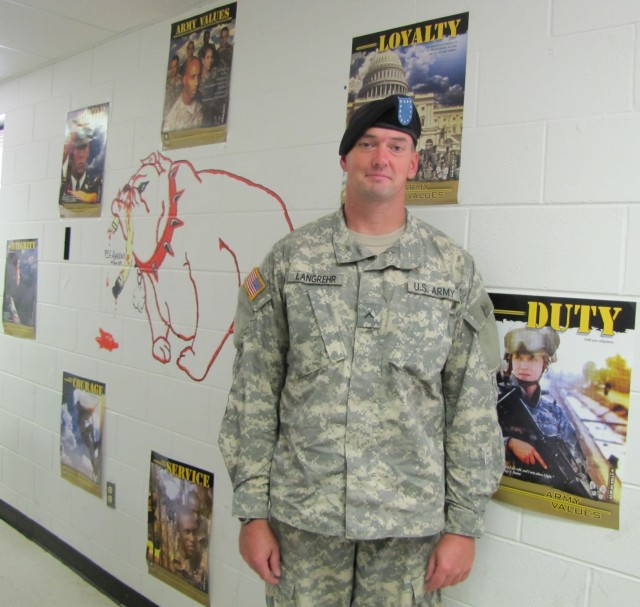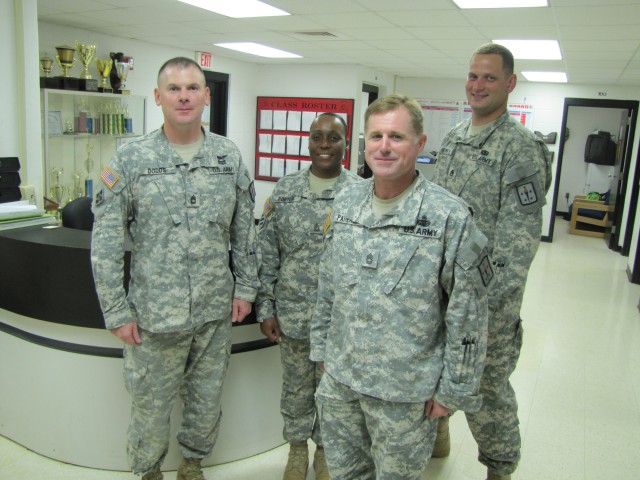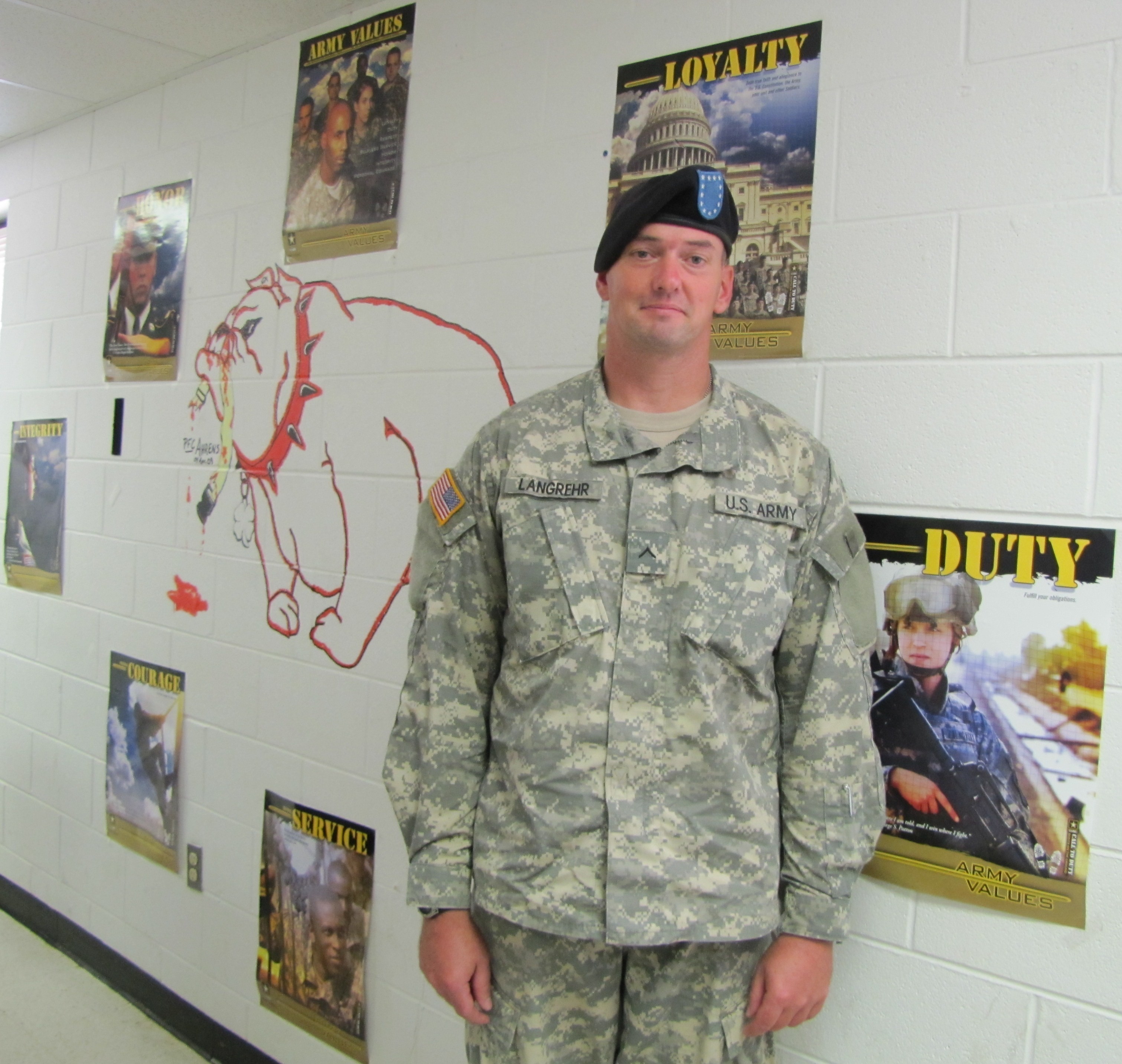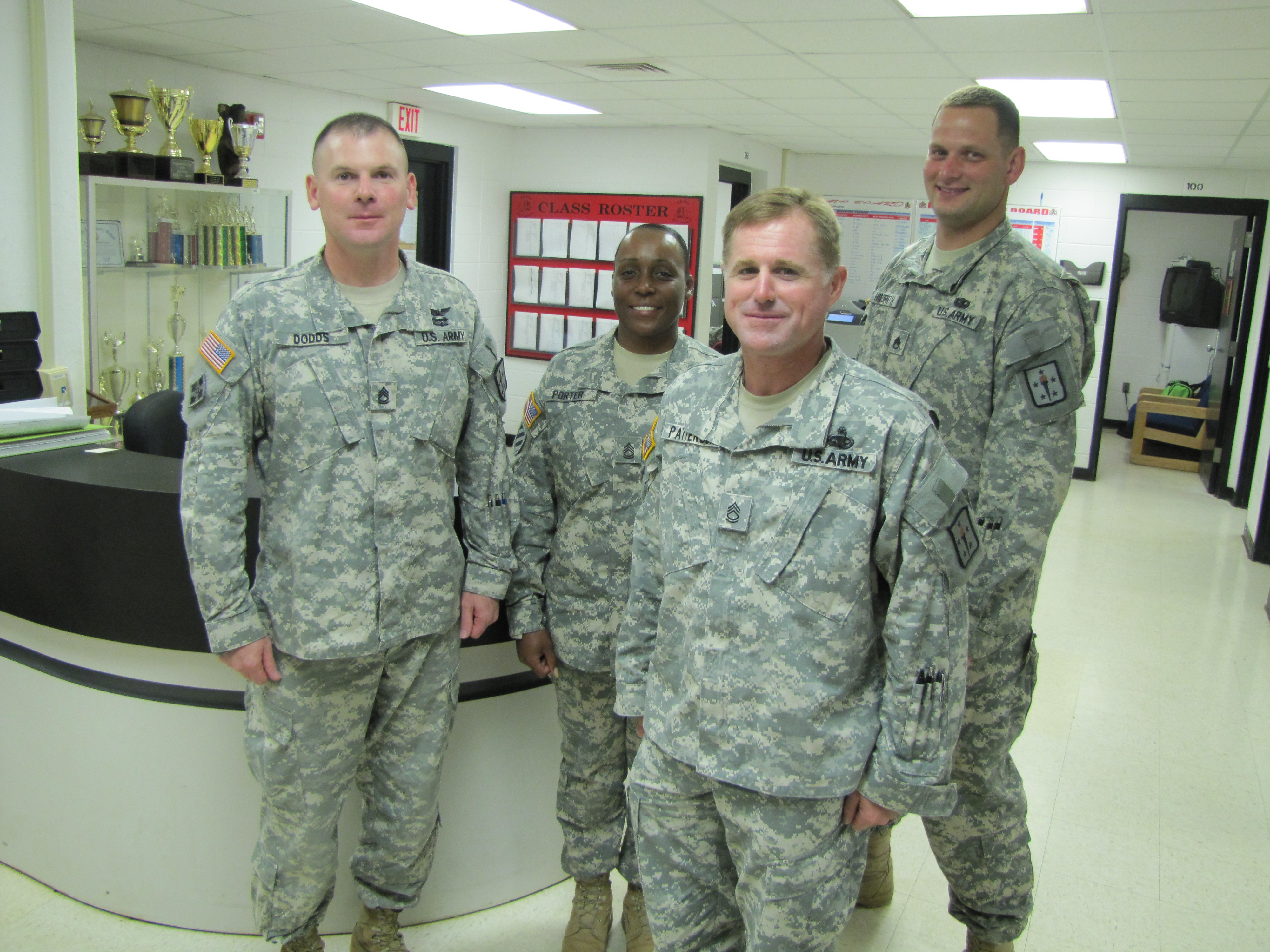REDSTONE ARSENAL, Ala. -- Although tough economic times can help with Army recruiting, it wasn't the economy that drove Pvt. Dale Langrehr to join the Army at age 41.
Rather, it was the challenge.
And, along with that came opportunity, a new skill, a regular paycheck, good benefits and a sense of purpose.
This longtime truck driver is now a mobile rocket repairer, having just completed advanced individual training at the Ordnance Munitions and Electronics Maintenance School. He is looking forward to using his new mechanics skill as a Soldier stationed in Korea. He also hopes to put that skill to work in the civilian world once he serves his four-year enlistment.
"I just got tired of truck driving. I wanted a challenge. So I joined the Army," Langrehr said. "I was the oldest one to come through the doors at the recruiting station in my hometown (in Northern California). They said I was the first one there to actually join at my age. This was a good challenge for me. I wanted something totally different. I wanted to see if I could do it. And I did."
But before the Army would give him the OK to go to basic training at Fort Sill, Okla., Langrehr had to pass a thorough physical that included an EKG reading, something that's not required of younger Soldiers. To get ready for basic training, Langrehr frequently ran and lifted weights.
His family wasn't too sure about his decision to join the Army at an age that put him only one year short of the enlistment cutoff -- and, in most cases, at least 22 years older than most other privates.
"They thought I was a little crazy. But I'm not married and I don't have any children. So, that made it easier," Langrehr said. "My sister thought it was pretty cool that I made it through basic at my advanced age."
While stationed at Redstone, Langrehr, now 42, actually won a physical training award by scoring 90 or higher in all three events -- pushups, sit-ups and running. Even though he is much older than the typical Army private, he is in great physical shape.
And with his age comes experience and a greater sense of responsibility, something he hopes will benefit the Army. He already has 17 years of experience working in a sheet metal shop along with experience working at a logging camp and in a warehouse, and driving a cement truck.
"I know I'm not as young as other guys. But I felt like I had other things I could offer," he said. "I know I'm more responsible than some of these kids who like to drink and party. I'm not too much into that anymore. I like the structure and discipline of the Army."
"I do get a lot of old jokes. But I just look at it as I am an older person who wanted to join the Army."
'Ton of rules'
After so many years as a civilian employee, Langrehr said Army expectations were a little overwhelming at first.
"There are a ton of rules. But I understand that because the platoon sergeants are working with a lot of young people," he said.
The Army has the highest cutoff age for new recruits at 42, which was increased from 35 in 2006. The cutoff for the Navy is 35, the Marines is 28 and the Air Force is 27.
"There really is no issue with an older recruit," said retired Master Sgt. John Towers, a marketing and missions analyst with the 2nd Recruiting Brigade headquartered at the Arsenal. "Everybody can serve. The Army can always find something for everyone to do."
"Older recruits have a level of maturity that we often don't see in 18, 19 and 20 year olds and even in college graduates."
Yet, even in a slumped economy, most Army recruits fall within ages 18 to 25. The number of recruits beyond 25 is only a small percentage of all recruits, Towers said.
"The economy is pushing older recruits, but it's not having as much effect as you might think," he said. "Older people aren't as attracted to the military because they are more settled and they have other options. A lot of times older recruits are prior service and they want to come back in."
There are those older recruits who, even though they have a career, join the military because it's something they've always wanted to do.
"For these older recruits, the military is more of a challenge. It's something they felt they should have done. They may feel this way because they want to serve their country in a patriotic manner. Or they may see it as community service," Towers said.
Recruiters often talk a different message with older recruits, emphasizing benefits.
"Older recruits usually have a wife or husband and children," Towers said. "When we discuss benefits, we have to include the family. Taking care of their family is a top priority for them."
The Army can afford to be picky when it comes to older recruits, Towers said, especially in south central U.S. (Texas, Arizona and New Mexico) and southeast U.S. regions, which are both consistently at the top of the recruiting numbers.
Each year, the military recruits about 300,000 new recruits to maintain a 2.26 million force of Soldiers, sailors, airmen and Marines. In 2008, the Army brought in more than 80,000 new recruits. While the Army's goal in fiscal 2009 was 65,000, it actually signed 70,045, according to a Pentagon report.
"The whole recruiting command is doing well right now," he said. "In mid-August, we might have to lower our monthly mission because we will be so close to fulfilling the Army's end strength for the year. The end strength is capped by Congress and is measured on Oct. 1. As we get closer to that date this year, we are more selective with our recruits."
Bringing experience
Over at Bravo Company, platoon sergeants can see the difference older privates make in their platoons. But they don't have to be Langrehr's age 42 to be among the unit's mature Soldiers.
"If they come in and they are in the early to mid-30s, we consider them older," Sgt. 1st Class Chris Patterson said. "It's because we (the company's cadre) is at that age and we've already had an Army career under our belts. Soldiers in their 30s just now entering into service have had prior experience in life."
Although older privates are identified and thought of as potential leaders among the younger troops, they still have to contend with rules and instructions that may seem worlds apart from their current experience and knowledge.
"The type of training they receive is pretty much geared in one direction and focused on 18 and 20 year olds just coming in," Patterson said. "When the older Soldier comes in, we don't know the kind of person we are getting. They bring to bear some experiences we haven't had. And we also have to take their physical strengths and abilities into consideration."
If an older private comes in with positive experiences and a good attitude, they can quickly go the top of the class, said Sgt. 1st Class Sonya Porter.
"They can use their good life experiences to help relate to the younger Soldiers and talk to them about their future," she said. "They can be good mentors and the younger Soldiers will be able to see their maturity in their actions."
"But, if they never matured, they can become very detrimental and they can get an attitude that they don't need to listen to their sergeants."
Platoon sergeants are charged with preparing Soldiers for the Army experience, which often includes counseling young Soldiers about personal, financial and emotional issues that may arise during training. With the older Soldier, that job often involves learning about the Soldier's personal and professional history to better acclimate them to the Army experience.
"You've got to get to the root of where they are coming from and understand their demographics," Sgt. 1st Class Derrick Dodds said.
"They could be a previous small business owner or they could have been climbing the corporate ladder, and something happened to take that all away. They see the military as a decent opportunity to maintain cohesiveness for their family."
Mentoring conditions
Often, platoon sergeants pair up older privates with younger privates, hoping that a mentoring situation will evolve naturally. Often times, older privates have more motivation and drive, and need to feel they are contributing and making a difference within their unit.
"We want to give them a sense of responsibility. They've already had responsibility at their age, so we want to give them someone they can mentor," Dodds said.
"They are more apt to be able to deal with things better if they feel like they are helping younger Soldiers. We don't want to throw their age and experience in their face. We want them to see it as something that benefits the Army and that can benefit themselves in the Army," added Sgt. 1st Class Andrew Hildreth.
The command cadre at Bravo Company have had plenty of experience themselves working with the dynamics of older privates. In one situation, the cadre put two 42 years olds together as roommates and buddies.
"It ended up they were both too independent and used to being in charge, and it caused problems," Dodds said. "It just didn't work out."
The Soldiers were reassigned, with one, who happened to be from Puerto Rico, paired with a younger private who was also from Puerto Rico. It turned out the older private knew the younger private's family, and became a good mentor to the younger private.
Tackling challenges
There have been times when the cadre has released an older private. Such was the case with an older private who had recurring knee issues, and family and financial issues.
"He came in because of the economy and his sense of wanting to do something for his country," Patterson said. "But he was making 2 and 1/2 times more as a civilian than he was as a private."
"He had lost his job as a certified mechanic working on exotic cars. But then his spouse, who also worked in the auto industry, was going to be laid off, and hardships developed in the family with a father-in-law who needed care and a brother-in-law who was partially mentally handicapped.
The private's civilian employer said they would hire him back, so he requested a release. He did feel bad about not being able to complete his mission. But the excessive strain on his family was too much."
For those older privates who can stay the course, they do bring a lot to the unit.
"Most of the time, they can grasp the Army system faster," Patterson said. "They can make good judgment decisions quicker. And, they realize quickly that the Army does things for a reason."
Older privates usually are good at resolving their own issues with minimal guidance from a platoon sergeant.
"When a 40 year old comes in with an issue, you don't have to hold their hand through the whole process. You give them guidance and send them off, and they take care of things," Patterson said. "But a younger Soldier usually needs you to walk him through the whole process."
The platoon sergeants did agree that older privates seem to have more aches and pains. Unfortunately, age can make old injuries or recurring injuries flare up.
"If they make it through basic and then get here, the older ones have a tendency to have more heart. They came here for a reason and they will push through anything," Patterson said.
Patterson recalled one older private who developed shin splints after joining the Army. He denied the condition until the Bravo Company cadre forced him to get a checkup at Fox Army Health Center. The Soldier had three surgeries and then had to leave the Army because his condition did not improve adequately.
"He wanted to stay and do his part," Patterson said. "If older Soldiers can hold it together physically, then they make great Soldiers. But, if they can't perform physically, then the Army is not the place for them. This is a very physically demanding job and it does take its toll."
For those older Soldiers who are in good physical shape and can complete their enlistment, the Army can provide them with technical training, hands-on education and benefits that will make it easier for them to re-enter the civilian world.
"The Army is a good place because of the extensive military operations," Dodds said. "Any Soldier can leave the Army with a lot of technical training, education and benefits that will help them in whatever they decide to do."




Social Sharing